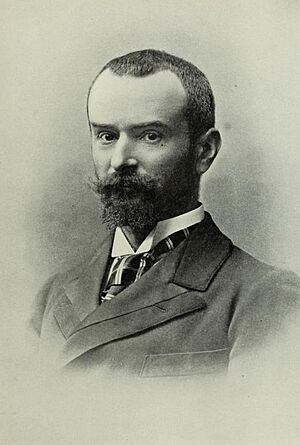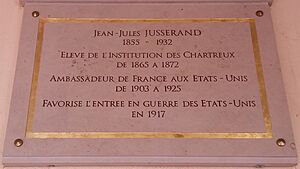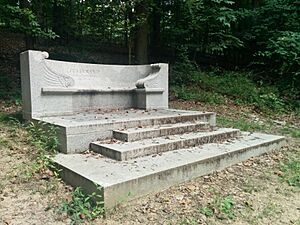Jean Jules Jusserand facts for kids
Quick facts for kids
Jean Adrien Antoine Jules Jusserand
|
|
|---|---|
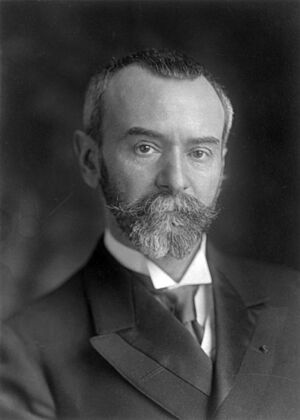
J. J. Jusserand in 1910
|
|
| French Ambassador to the United States | |
| In office 1902–1924 |
|
| Preceded by | Jules Cambon |
| Succeeded by | Émile Daeschner |
| Personal details | |
| Born |
Jean Adrien Antoine Jules Jusserand
18 February 1855 Lyon, France |
| Died | 18 July 1932 (aged 77) Paris, France |
| Spouse | Elisa Richards |
| Parents | Jean Jusserand and Marie Adrienne Tissot |
| Alma mater | University of Lyon |
Jean Adrien Antoine Jules Jusserand (born February 18, 1855 – died July 18, 1932) was a French writer and diplomat. He served as the French Ambassador to the United States from 1903 to 1925. He played a very important role in diplomacy, especially during World War I.
Contents
Early Life and Education
Jean Jules Jusserand grew up in a wealthy family from Lyon, France. He spent his childhood between his family home and a boarding school. His father passed away in 1870. After this, Jean was determined to honor his father by learning about new cultures. He wanted to have a successful career in international relations.
He studied at the University of Lyon. He learned about literature, science, law, and history. He was an excellent student in all these subjects. He earned two degrees, one in history and one in law. He also received a doctorate in history. Jusserand loved to travel the world, learn languages, and discover new things. He finished his studies in 1875 and started an international career.
A Career in Diplomacy
Jusserand's career began in 1878 when he was 23 years old. He applied for a national competition in Foreign Affairs. He started as a student-consul and then became an assistant-consul in London. His boss praised his excellent work.
In 1880, he worked for the Minister of Foreign Affairs, Jules Barthélemy-Saint-Hilaire. Later, in 1882, his writing skills helped him become a partner to Paul Cambon. Cambon was the French Minister in Tunisia. Jusserand helped organize the administration of the protectorate there. He became known as a respected diplomat because he helped make the protectorate more humane.
In 1887, Jusserand returned to the Quai d'Orsay, which is where the French Foreign Ministry is located. He worked in the political section. In 1898, he became an envoy to the Pope (Saint-Siège). Then he became the French Minister in Copenhagen. In 1902, under President Émile Loubet, Jusserand was named the Ambassador to the United States.
Ambassador in Washington
Jean Jules Jusserand became the new French ambassador in Washington on February 7, 1903. He took over from Jules Cambon.
Jusserand quickly became friends with President Theodore Roosevelt. He also got along well with the presidents who came after Roosevelt. For 22 years, Jusserand was the main French political voice in the U.S. He worked with five different American presidents: Roosevelt, Taft, Wilson, Harding, and Coolidge. From May 1913 to January 1925, he was the longest-serving diplomat in Washington.
In June 1905, France and Germany were close to war over who would control Morocco. Jusserand used his influence with President Roosevelt. This helped Roosevelt play an important role in the Algeciras Conference. The support from the United States and the United Kingdom helped France gain access to the Moroccan Empire. Many people, both American and French, felt that Jusserand had "saved the peace."
During World War I
Jean Jules Jusserand played a key role in getting the United States to join World War I. As early as 1914, he worked hard to convince the U.S. to support France. This was a very worrying time for Jusserand. American public opinion was very divided about joining the war. It took more than three years for the U.S. to enter the war. This happened after Germany started attacking ships with submarines.
On March 12, 1917, the House of Representatives allowed commercial ships to be armed. After German U-boats attacked two U.S. ships, President Wilson realized on March 20 that the U.S. was actually at war. On April 2, he told Congress that he wanted to join the war with the Allies. This meant sending American troops to France. The U.S. Senate approved this by a vote of 82 to 6. On April 6, 1917, the U.S. officially entered the war.
On June 28, 1917, the first American division landed in France. Jusserand said, "For the first time, a neutral nation has decided to enter the conflict without prior bargaining, without having laid down a condition." French Prime Minister Georges Clemenceau congratulated him. On November 11, the armistice was signed, ending World War I.
Jusserand also helped professor Thomas Garrigue Masaryk and his legions. He supported negotiations for an independent Czechoslovak state in America from May to October 1918.
For the peace talks in Versailles, President Wilson trusted Jusserand and brought him to France. Wilson was the first U.S. president to visit Europe while in office. The Paris Peace Conference started on January 18, 1919. It led to the signing of the Treaty of Versailles on June 28. This treaty aimed to establish lasting peace.
After the War
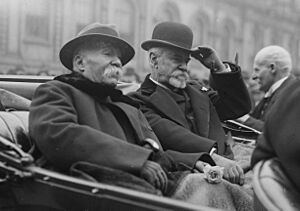
Even after World War I, Jean Jules Jusserand continued to work for peace. He went with American President Woodrow Wilson to the Paris Peace Conference (1919). This is where the Treaty of Versailles was signed. When the Polish army invaded Ukraine, Russia counter-attacked. Revolutionary ideas were spreading in Warsaw. France sent Jusserand on a special mission to help save the Polish.
He remained the French ambassador to Washington for five more years. He served under Presidents Warren G. Harding and Calvin Coolidge. During this time, he published many books in French and English. After his retirement, he returned to France. He spent time with his wife at their home in Saint-Haon-le-Châtel.
In 1923, Jean Jules Jusserand gave a speech at the opening ceremony for the American war memorial. He retired at the age of seventy. Émile Daeschner took over his role in 1924.
On January 10, 1925, the American government held a farewell dinner for him. They wanted to show their respect and thanks. Many important political, scientific, and cultural figures attended. He also received a medal for his work.
In 1930, Jean Jules Jusserand published his last book. It was called The evolution of the American sentiment during the war. He passed away in Paris in 1932 at age 77. His funeral was held at Notre-Dame Cathedral. His body rests in his family home.
Alliance Française
In 1884, Jean Jules Jusserand helped create the Alliance Française. This is a French organization that promotes French culture and language around the world. It was especially important after France's defeat by Germany in 1870.
The Alliance Française is independent and not influenced by politics or religion. The main Foundation of the Alliance Française guides other Alliance Française centers. It approves new centers and helps them train staff. It also supports them in expanding their activities or during difficult times.
Today, the Alliance Française is the largest cultural Non-Governmental Organization in the world. It has about 1,000 centers in over 136 countries. The Alliance Française in Lyon was founded in 1984. It is now the top French language school in Lyon and the third largest Alliance Française in France. It has a diverse team of 40 people. They welcome 2,500 students from more than 130 countries each year. The school has 2,500 square meters of modern classrooms for language learning. It continues the spirit of its founders, including Jusserand.
Legacy and Memorials
Even today, there are monuments in France and the United States that remember Jusserand's important diplomatic work.
A pink granite bench in Rock Creek Park in Washington D.C. honors Jusserand. President Franklin Delano Roosevelt dedicated it on November 7, 1936. It was the first memorial on U.S. federal land dedicated to a foreign diplomat. In 2014, a local newspaper called it the "best obscure memorial" in D.C.
Literary Works
Jusserand was a dedicated student of English literature. He wrote several clear and lively books about less-known topics.
Books in French
- Le Théâtre en Angleterre (1878) - About theater in England.
- Les Anglais au Moyen Âge (1884) - About English life in the Middle Ages.
- Le Roman au temps de Shakespeare (1887) - About novels during Shakespeare's time.
- Histoire littéraire du peuple anglais (1893-1909) - A literary history of the English people.
- L'Épopée de Langland (1893) - About the epic poem Piers Plowman.
- Le Roman d'un roi d'Écosse (1895) - About the life of a Scottish king.
- Histoire abrégée de la littérature anglaise (1896) - A short history of English literature.
- Shakespeare en France sous l'ancien régime (1898) - About Shakespeare in France long ago.
- Les Sports et jeux d'exercice dans l'ancienne France (1901) - About sports and games in old France.
- Ronsard (1913) - About the poet Ronsard.
Books in English
- A French Ambassador at the Court of Charles II (1892) - Based on old papers.
- English essays from a French pen (1895) - Essays written from a French perspective.
- A Literary history of the English people from the origins to the Renaissance (1895)
- A Literary history of the English people from the Renaissance to the Civil War (1906)
- Piers Plowman, the work of one or of five (1909) - More on Piers Plowman.
- With Americans of Past and Present Days (1916) - For this book, he won the first Pulitzer Prize for History.
- The School for ambassadors and other essays (1925) - A collection of essays.
- The evolution of the American sentiment during the war (1930) - His last book.
- What Me Befell : The Reminiscences of J. J. Jusserand (1933) - His memories.
See also
 | Delilah Pierce |
 | Gordon Parks |
 | Augusta Savage |
 | Charles Ethan Porter |


